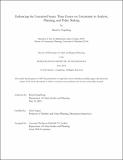Embracing the Uncertain Future: Three Papers of Uncertainty in Analysis, Planning, and Policy-Making
Author(s)
Engelberg, Daniel L.
DownloadThesis PDF (1.767Mb)
Advisor
Zegras, Chris
Terms of use
Metadata
Show full item recordAbstract
Uncertainty is inseparable from long-range planning. In striving for just, equitable, and sustainable futures, we are always confronted with the limits of our own understanding. Looking far into the future, or even trying to properly assess the ground beneath our feet, often reveals much more about what we are unsure of than what we can predict with confidence. However, uncertainty is still largely treated as subordinate in urban planning, either not grappled with at all or applied as an addendum to mean trend forecasting. This dissertation seeks to invert the traditional approach by placing uncertainty at the center of planning within three stages of the planning process: simulation analysis, planning, and policy making. The objective of this three-paper dissertation is then to examine how uncertainty interacts with three stages in the urban planning and policy making process; and to suggest how centering uncertainty can improve planning. The first paper considers the analysis of policy options under uncertainty in land use and transportation simulation. This paper demonstrates the applicability of scenario discovery, a research design for decision making under deep uncertainty, in land use and transportation models. I find that scenario discovery performs marginally better in identifying robust strategies relative to more circumscribed approaches, but significantly enhances insights regarding adaptive policy making. The second, lead-authored paper asks what impact uncertainty has on the climate policy disposition of municipal elected officials. We sent a survey to elected officials in cities with greater than 100,000 people querying their degree of climate policy uncertainty as well as their propensity to support climate policies. Using a structural equation model with a novel latent variable measure of climate uncertainty, we demonstrate that uncertainty diminishes propensity for climate policy. My final paper delves into the use of scenario planning to support racial equity planning. From the literature on equity in scenario planning and my own experience, I develop a novel framework for using scenario planning to promote racial equity. This framework builds on the five types of racial equity, a six-stage hybrid scenario process, and the three outcomes of public sector scenario planning: organizational learning, organizational strategy, and community learning. Using this framework, I assess the inclusion of equity in the Delaware Valley Regional Planning Commissions Dispatches from Alternative Futures scenarios plan. This plan successfully raises racial equity as a concern for the future of the Philadelphia region. However, the stakeholder group was not sufficiently diverse for full deliberative justice and the scenario planners do not utilize tools that can assess the distributional outcomes of scenarios and policies. Neither epistemic nor restorative justice were a significant part of the scenario plan, leaving open the possibility for more radically co-designed scenarios for racial equity in the future.
Date issued
2023-06Department
Massachusetts Institute of Technology. Department of Urban Studies and PlanningPublisher
Massachusetts Institute of Technology